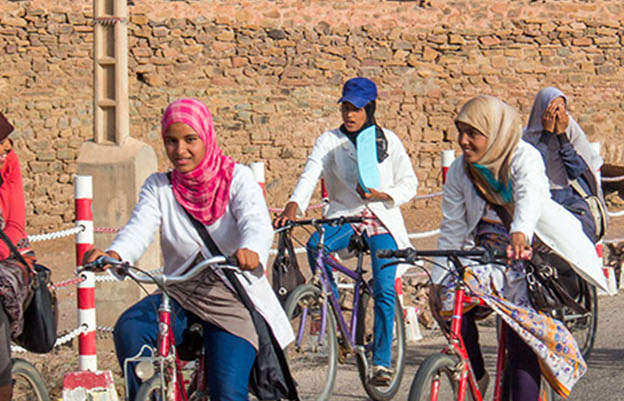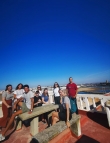‘Getting out of your comfort zone in a comfortable way’
When asking the new students how they first heard about the NIMAR, Emma notes that this was during her second year of the Bachelor cultural anthropology and development sociology at Leiden University. When a group of students gave a short presentation about their experiences with the minor ‘Culture and Society in Morocco’, she got enthusiastic right away. “For me, this minor is a good opportunity to experience what it is like to live and study abroad for a little while in a safe environment. Like director Léon Buskens said during the introduction day: ’It is like getting out of your comfort zone in a comfortable way’”. She further adds that everything is well organized, and the staff will help you with settling down after you have arrived in Rabat.
The minor: a useful mixture between theory and practice
In addition to the cultural experience in a safe environment, students also mention that the combination between learning and bringing the newly achieved knowledge of the country and language in practice, really appeals to them. The combination of following lectures and doing your own qualitative research is a very educative way of learning, according to Emma: “Everything you learn during the lectures, you can practice while you are doing your own research, and I am really looking forward trying to make myself ‘at home’ in a different, ‘non-western’ country”.

Learning and using Darija
The Moroccan Arabic classes have already started and Elze sighs “What an interesting and difficult language! Our throats began to hurt with the pronunciations of all the g, q, r and h sounds, but slowly and steadily we learned how to pronounce words and small sentences”. She continued by saying that it was nice to notice certain words and mannerisms on the street that they have learned about during class.
“People start to recognize us and want to help us practicing Darija!”
Emma agrees and elaborates on her morning routine in which she and her roommate buy some fruits, vegetables and bread at small, local shops in their street. In this way we try to get to know our neighborhood and neighbors. Already after a couple of days, people started to recognize them and were willing to help them with learning and practicing Darija. “I am really looking forward to being able to have a small talk with my neighbors in the local spoken language after a couple of weeks studying Darija at the NIMAR institute. In ša łłah”.

For Dutch Egyptian French schooled Linda, the local languages are more familiar. She describes the surprising trajectory that led her to Rabat in a personal blog about her roots and decisions.



